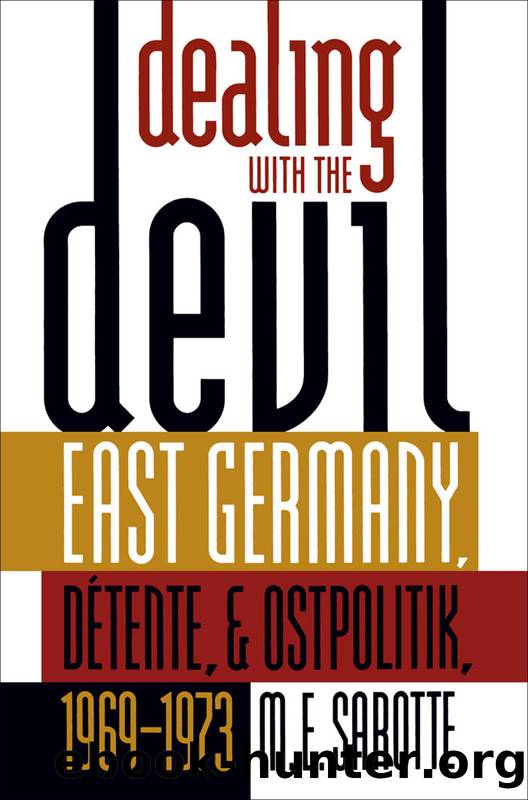Dealing with the Devil by M. E. Sarotte

Author:M. E. Sarotte [Sarotte, M. E.]
Language: eng
Format: epub
ISBN: 9780807849156
Publisher: UNC Press
Published: 2001-09-15T05:00:00+00:00
The Caesura of 1973
For all of these reasons, by the end of June 1973 it was possible to resolve the controversy over emigration blockage (although it would hardly be the last one). Only a handful of open cases remained. Bahr informed Kohl of the transfer of DM 10 million of the âchild supportâ money.193 Moreover, the Bavarian legal challenge to the Basic Treaty failed in the summer of 1973, and the accord went into force as a result. Also that summer, a Cold War chapter closed with the death of Walter Ulbricht, and another chapter began with the formal opening of CSCE. In the second half of 1973, the FRG negotiated a treaty with Prague similar to the Warsaw accord.194 Given the momentum produced by these events, the entry of the two Germanies into the UN proceeded with less difficulty than the contentious nature of previous talks about it had suggested it would. In September of 1973, East and West Germany became respectively the 133rd and 134th members of the United Nations.195 Soon thereafter, questions of German-German relations would take a back seat to dramatic domestic developments in both West Germany and the United States. Brandt would face the exposure of a Stasi agent, Günter Guillaume, on his personal staff; Nixon would endure the revelations of Watergate. In yet another parallel, both leaders would find themselves forced to resign.
Both Michael Kohl and Egon Bahr took advantage of the caesura of 1973 to resign from the wearying task of normalizing German-German relations.196 Under Michael Kohl, the SED delegation had managed to fulfill its goals of securing payment in return for human rights concessions and of gaining recognition both from the FRG and the world community. It also achieved its priority of avoiding any direct acknowledgment of âGermanyâ as a united nation. This priority mirrored that of the Soviet Union. The GDR had pushed quite hard to get the Eastern treaties ratified precisely because, in Soviet thinking, they precluded changes to the Cold War status quo, achieved arduously via the Second World War and subsequent superpower confrontation. Under Bahr, the FRG delegation also achieved one of its top priority goals, namely, obtaining some kind of reference to the nation. It also avoided any definite signs that the accord established the division as permanent. Given the difficulties and many points of contention involved, it is not surprising that the Basic Treaty was limited in its achievement. Countless issues remained open, such as questions of citizenship and property ownership. Kohl and Bahr had not reached a resolution, but rather the beginning of a more intense exchange about the issues that divided the Germanies.
Throughout their talks, both Bahr and Kohl had had to take into account the concerns of each otherâs respective superpower ally. East Berlin in particular had endured micromanagement by Moscow in nearly every aspect of negotiating and implementing the treaty. The Basic Treaty, which regulated German-German local and even individual controversies, thereby became intimately linked to the global Cold War concerns of the Soviet superpower.
Download
This site does not store any files on its server. We only index and link to content provided by other sites. Please contact the content providers to delete copyright contents if any and email us, we'll remove relevant links or contents immediately.
Room 212 by Kate Stewart(5107)
The Crown by Robert Lacey(4810)
Endurance: Shackleton's Incredible Voyage by Alfred Lansing(4773)
The Iron Duke by The Iron Duke(4351)
The Rape of Nanking by Iris Chang(4208)
Joan of Arc by Mary Gordon(4104)
Killing England by Bill O'Reilly(3998)
Say Nothing by Patrick Radden Keefe(3976)
I'll Give You the Sun by Jandy Nelson(3431)
Shadow of Night by Deborah Harkness(3361)
Hitler's Monsters by Eric Kurlander(3331)
Mary, Queen of Scots, and the Murder of Lord Darnley by Alison Weir(3208)
Blood and Sand by Alex Von Tunzelmann(3199)
Eleanor & Park by Rainbow Rowell(3156)
Darkest Hour by Anthony McCarten(3121)
Margaret Thatcher: The Autobiography by Thatcher Margaret(3081)
Book of Life by Deborah Harkness(2935)
Red Famine: Stalin's War on Ukraine by Anne Applebaum(2930)
The One Memory of Flora Banks by Emily Barr(2857)
